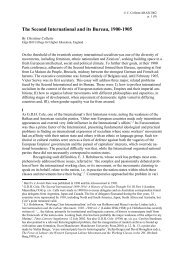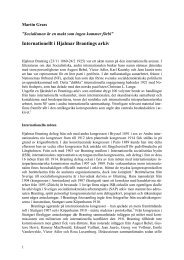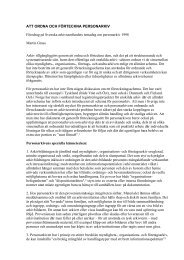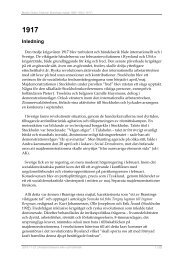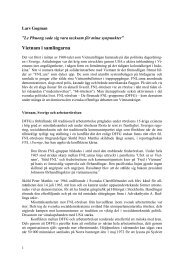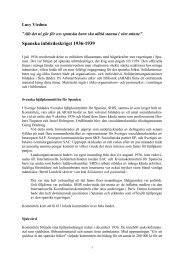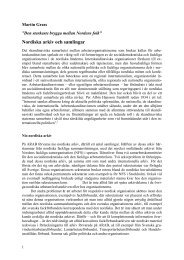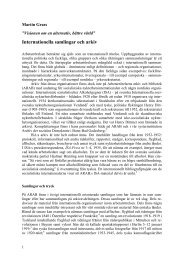Communism, Social Democracy and the Democracy Gap
Communism, Social Democracy and the Democracy Gap
Communism, Social Democracy and the Democracy Gap
You also want an ePaper? Increase the reach of your titles
YUMPU automatically turns print PDFs into web optimized ePapers that Google loves.
© S. Berger/ARAB 2002<br />
p. 2 (14)<br />
wish list.' 5 A thorough comparative analysis of <strong>the</strong> engagement of Communist <strong>and</strong> <strong>Social</strong><br />
Democrat parties with <strong>the</strong> concept <strong>and</strong> <strong>the</strong>ory of democracy would undoubtedly reveal<br />
important differences between different parties, but it is my contention here that<br />
everywhere debates about democracy had to follow <strong>the</strong> framework set by <strong>the</strong> debates on<br />
capitalism. Even <strong>the</strong> lapsed Communist Arthur Rosenberg, who famously attempted to<br />
write <strong>the</strong> history of 150 years of socialism under <strong>the</strong> analytical framework of '<strong>Social</strong>ism<br />
<strong>and</strong> <strong>Democracy</strong>' could not escape this discursive patterning. Rosenberg distinguished<br />
between socialist democracy <strong>and</strong> various forms of bourgeois democracies. A socialist<br />
democracy was defined by its ultimate desire to abolish capitalism <strong>and</strong> introduce <strong>the</strong> selfgovernment<br />
of <strong>the</strong> masses. By contrast, <strong>Social</strong> <strong>Democracy</strong>, for Rosenberg, was one of <strong>the</strong><br />
four types of bourgeois democracy. While it strove for <strong>the</strong> political emancipation of <strong>the</strong><br />
working classes, it did not question <strong>the</strong> existence of private ownership of <strong>the</strong> means of<br />
production. Hence it was closer to <strong>the</strong> o<strong>the</strong>r three types of bourgeois democracy:<br />
imperialist (Engl<strong>and</strong>), liberal (Switzerl<strong>and</strong>, Norway) <strong>and</strong> colonial (Canada) democracies. 6<br />
And of course, to name but one more influential example, Max Horkheimer's famous<br />
dictum: 'Whoever does not want to talk about capitalism should also be quiet about<br />
fascism' (Wer vom Kapitalismus nicht reden will, sollte auch vom Faschismus<br />
schweigen.) also reads: Whoever wants to talk about democracy (or any political system,<br />
for that matter), also has to talk about capitalism. Not only Marxist historians <strong>and</strong><br />
politicians started from <strong>the</strong> assumption that <strong>the</strong> economic system determined politics; it<br />
was a contention shared by many of those bourgeois social historians who employed Max<br />
Weber's social <strong>the</strong>ory in <strong>the</strong> writing of <strong>the</strong>ir histories. They too believed that social <strong>and</strong><br />
economic change determined political change. The rise of poststructuralism <strong>and</strong> of a new<br />
political history in <strong>the</strong> 1980s <strong>and</strong> 1990s has criticised such assumptions <strong>and</strong> instead<br />
emphasised <strong>the</strong> autonomy of political processes <strong>and</strong> <strong>the</strong> constructedness of concepts <strong>and</strong><br />
ideas employed to underst<strong>and</strong> <strong>the</strong> world. But for much of <strong>the</strong> twentieth century,<br />
Communist <strong>and</strong> <strong>Social</strong> Democratic historiographies shared <strong>the</strong> firm belief in <strong>the</strong> existence<br />
of such links between a primary economic order <strong>and</strong> a secondary political system.<br />
If capitalism was <strong>the</strong> lynchpin of <strong>the</strong> debate, Communists <strong>and</strong> <strong>Social</strong> Democrats<br />
<strong>and</strong> <strong>the</strong>ir respective historiographies also debated <strong>the</strong> merits <strong>and</strong> meanings of 'democracy'.<br />
Both ideologies attempted to claim <strong>the</strong> idea of democracy for <strong>the</strong>mselves. Communists<br />
tended to start from Marx's distinction between bourgeois <strong>and</strong> proletarian democracy. 7 In<br />
<strong>the</strong> French revolution of 1848, Marx argued, <strong>the</strong> two concepts of democracy had parted<br />
company for <strong>the</strong> very first time. Bourgeois democracy rested on <strong>the</strong> twin pillars of <strong>the</strong><br />
individual rights <strong>and</strong> freedoms <strong>and</strong> <strong>the</strong> rule of law. <strong>Democracy</strong> here was a formal<br />
mechanism of interest representation. Proletarian democracy started from <strong>the</strong> assumption<br />
that <strong>the</strong> formal democratic mechanisms had to be filled with social content. Fur<strong>the</strong>rmore,<br />
political democracy was in need of being supplemented by <strong>the</strong> democratisation of power<br />
relationships in <strong>the</strong> economy <strong>and</strong> in society as a whole. Representative democracy<br />
restricted to <strong>the</strong> political sphere would eventually give way to participatory democracy in<br />
as many fields of society as possible. In later years, <strong>the</strong> council democracy of <strong>the</strong> Paris<br />
Commune was to provide a model for Marx's underst<strong>and</strong>ing of a genuine proletarian<br />
democracy. 8 For Marx such a participatory democracy would make <strong>the</strong> state <strong>the</strong> servant of<br />
genuine human needs. In this respect, Marxism proved <strong>the</strong> mirror opposite of Hegelian<br />
state philosophy.<br />
5 Will Hutton, The State We're In (London 1995), p. 48.<br />
6 Arthur Rosenberg, Demokratie und Sozialismus (Frankfurt am Main 1962; first published in 1938), p. 302<br />
f.<br />
7 Karl Marx, The Eighteenth Brumaire of Louis Bonaparte, 3 rd rev. edn (London 1954).<br />
8 A. Demirovi, 'Marx und die Aporien der Demokratie<strong>the</strong>orie', Das Argument, vol. 30 (1988), pp. 847-60.



